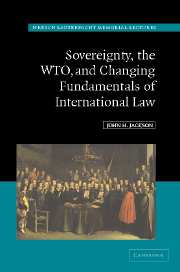Crossref Citations
This Book has been
cited by the following publications. This list is generated based on data provided by Crossref.
Schneiderman, David
2006.
Transnational Legality and the Immobilization of Local Agency.
Annual Review of Law and Social Science,
Vol. 2,
Issue. 1,
p.
387.
Lovell, Martin
2007.
Regional Trade Agreements and the WTO: An Analysis of the Efficacy of the Asean-China Free Trade Area (ACFTA) Forum Selection Clause in Resolving Jurisdictional Conflict.
SSRN Electronic Journal,
Maniruzzaman, A. F. M.
2007.
Managing Globalization: Challenges Facing International Law in the 21st Century.
SSRN Electronic Journal,
Qin, Julia Ya
2008.
China, India, and the Law of the World Trade Organization.
Asian Journal of Comparative Law,
Vol. 3,
Issue. ,
p.
1.
2008.
Verselbständigungsprozesse internationaler Organisationen.
p.
229.
Hamilton, Daniel S.
2008.
The United States: A Normative Power?.
SSRN Electronic Journal,
Delimatsis, Panagiotis
2009.
Concluding the WTO Services Negotiations on Domestic Regulation – Walk Unafraid.
SSRN Electronic Journal,
Chen, Chun-ming (Kevin)
2009.
On a Coherence Approach Towards Jurisdictional Conflicts between the WTO and RTAs.
SSRN Electronic Journal,
Smith, Andy
2009.
How the WTO Matters to Industry: The Case of Scotch Whisky.
International Political Sociology,
Vol. 3,
Issue. 2,
p.
176.
Varella, Marcelo D.
2009.
The effectiveness of the Dispute Settlement Body of the World Trade Organization.
Journal of International Trade Law and Policy,
Vol. 8,
Issue. 2,
p.
100.
Guthrie, Karina
2010.
South Pacific Civil Aviation Safety and Security Through Regionalism: New Initiatives for the Pacific Aviation Safety Office.
Journal of Policing, Intelligence and Counter Terrorism,
Vol. 5,
Issue. 1,
p.
58.
Qin, Julia Ya
2010.
China, India and the International Economic Order.
p.
167.
Mayeda, Graham
2010.
Pushing the Boundaries: Rethinking International Law in Light of Cosmopolitan Obligations to Developing Countries.
Canadian Yearbook of international Law/Annuaire canadien de droit international,
Vol. 47,
Issue. ,
p.
3.
Horlick, Gary N.
and
Fennell, Katherine
2011.
Law and Development Perspective on International Trade Law.
p.
161.
BROWN WEISS, Edith
2011.
International Law in a Kaleidoscopic World.
Asian Journal of International Law,
Vol. 1,
Issue. 01,
p.
21.
Trejo-Mathys, Jonathan
2012.
Towards a discourse-theoretical account of authority and obligation in the postnational constellation.
Philosophy & Social Criticism,
Vol. 38,
Issue. 6,
p.
537.
Carrillo-Santarelli, Nicolás
2012.
Enhanced Multi-Level Protection of Human Dignity in a Globalized Context through Humanitarian Global Legal Goods.
German Law Journal,
Vol. 13,
Issue. 7,
p.
829.
Grossman, Gene M.
Horn, Henrik
and
Mavroidis, Petros C.
2012.
Legal and Economic Principles of World Trade Law: National Treatment.
SSRN Electronic Journal,
Jin, Gao
2013.
Suggestions for Construction of Chinese Green Barrier.
Advanced Materials Research,
Vol. 664,
Issue. ,
p.
240.
CHEN, An
2013.
The Voice from China.
p.
241.



